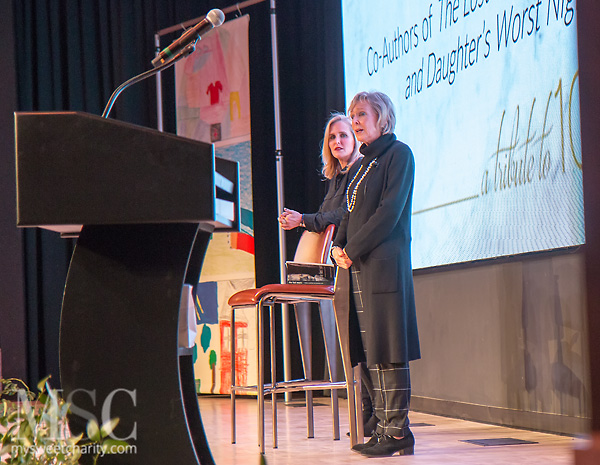This year’s Soup’s On! Luncheon benefiting The Stewpot Alliance was moved and moving. Instead of returning to the Omni or Reunion Station, Event Co-Chairs Kelly Garlock and Allison Salas Fasy “moved” the chefs and hundreds of guests east to the refreshed Statler, just a couple of blocks away from The Stewpot on Monday, January 29.
To commemorate its tenth anniversary, the occasion was also used to salute the Soup’s On! founders (Rusty Duvall, Janet Evans, Bonnie Mastin, Dian Moore, Debbie Raynor and Bonnie Thompson) as honorary co-chairs.
As for the “moving” part of the event, that was left in the hands of mother-daughter co-authors Constance Curry Truitt and Kristina Wandzilak. But more about that later.

Before the doors to The Statler’s ballroom opened, Kelly and Allison were giving an interview to a television station and guests were in the upstairs lobby chatting and checking out the silent auction items. They were also buying soup bowls made especially for the occasion, unlike years past when the bowls were at the tables as favors. Man-of-the-hour was The Stewpot Founder Bruce Buchanan, who had just retired in December.


Back in the kitchen, the Chef Chair Brian Luscher and his celebrity chefs (The Statler Executive Chef Graham Dodds, 80/20 Hospitality Executive Chef Danyele McPherson, Easy Slider Chef/Co-Owner Caroline Perini, City Hall Bistro Executive Chef Jeramie Robison, Oddfellows Executive Chef Anastacia Quinones, Whistlebritches Chef/Owner Omar Flores, Mudhen Meat And Greens Executive Chef Suki Otsuki, Parigi Chef/Owner Janice Provost and Salum Chef/Owner Abraham Salum) were going over last minutes preparations for the serving of the soups.


Joining them was Jennifer Clifford, who had been part of the Soup’s On! program, when her husband Joe Clifford was Senior Pastor at First Presbyterian Church of Dallas before being named Senior Pastor at Myers Park Presbyterian Church in Charlotte, North Carolina. She had flown in from North Carolina especially to attend the 10th anniversary and had bunked down with her former Communities Foundation of Texas cohort Monica Egert Smith.



Soon the doors to the ballroom opened for guests like Jan Hegi, Mary McDermott Cook with daughter Grace Cook, Michael Meadows, Krystal Schlegel, Beth Mayfield, Stacey Walker, Holly Reed and Gail Davis and the program was underway with the serving of the soups and the presentation of the chefs who received gifts created by artist Brad Oldham.




As a surprise and a thank you to Brian, Kelly and Allison presented him with a personalized apron for his ten years of support. Immediately afterwards the chefs gathered for the annual group photo in the lobby and then headed to their restaurants.

Following the supping of the soup with an Celery Root Waldorf Salad entrée, the “moving” part of the program got underway with Constance and Kristina taking their places on stage with their book “The Lost Years: Surviving A Mother And Daughter’s Worst Nightmare.” Leaning on two bar stools, they took turns reading from the book.
At first Constance’s voice was so soft that some could barely make out her recalling her early days as a young woman when she met her future husband and was so impressed by his ways like smoking a cigar. As for the homeless and alcoholics, she thought she would never know anyone like that. After all, that was some old guy on the street.

But as time went by she discovered she was married to an alcoholic to whom she would give way to him and not stand up for herself or her children.
The signs of the family’s unraveling came to light when 13-year-old Kristina started changing. Her friends were different; her homework wasn’t done; she started climbing out the window at night frequently.
The parents fought and the other siblings were confused. Kristina was sent to rehab. It would be the first of many. She stayed there three days and escaped.
Eventually they found her and she behaved for a while. But when she started repeating her old ways, they returned her to rehab. Since she was a flight risk, the staff took her shoes away. Didn’t matter. She escaped again. “Now, she was shoeless and homeless.”

Her parents once again found her and drove her to a rehab clinic in Idaho. Constance recalled that ride with “a cigar-smoking husband and a raving alcoholic” as a nightmare. Three nights later Kristina had run away during the worst snowstorms in years. The staff thought she would return. Constance didn’t and felt hopeless. She came to the realization that she had no power and told God to take Kristina.
Two or three weeks later, Kristina showed up at the family’s front door. But Constance took a stand this time. She told Kristina that she had to make her own way and turned her daughter away.
At this point, Kristina took up the reading recalling how when she was 13 she had her first drink. By the age of 16, she was a dropout and into drugs. Her parents were supportive in her seeking help. As for the treatment center in Idaho, Kristina described the cabins as more like tents. During her time on the run in Idaho, she was shot at by a pig farmer.
When she did return to her hometown, she discovered that being homeless wasn’t so bad. She was free to do whatever she wanted to knowing that with the right amount of tears her mother would take her back. But this time the greeting was different — “Kristina, I love you, but you are not welcomed in my house.”
Constance picked up the reading saying, “I thought in two or three weeks she would return. But it was more than two years.” At this point, it was time to heal.
Kristina returned to the reading — “It was three years.” During that time she had jobs and rented a room. Time and time again she was fired because she only showed up sporadically.
With a voice slightly shaking, Kristina read how she was faced with the choice of either prostitution or home invasion. She opted for home invasion and broke into 23 homes. After the 22nd, she went to the streets in San Francisco. The first night she slept in a parking garage’s stairwell. She learned how to stay warm by sleeping at the end of alleys, on the hoods of cars, stuffing her clothes with newspapers and staying in bus stations for hours. Bathroom stalls provided some safety. For food, she would dig through dumpsters and wander hotel hallways for trays with leftovers. The worst time of day was between 2:30 a.m. and 5:30 a.m., when the streets were quiet and empty and the homeless retreated to their hideaways. Still she couldn’t imagine life without alcohol.
The end came when she was beaten and left for dead on September 4, 1993. At this point she decided she would die, but was arrested for drunken disorderly conduct. Instead of being jailed, she was taken to a homeless shelter realizing that if she had died, no one would have known of her death or cared.
Constance read how despite the years of absence, she still set a place at the dinner table on Sunday nights. The family was getting on with their lives.
Kristina returned reading how she called her mother and went through treatment for six months. But it wasn’t easy. Creating a life after being homeless was difficult. Because she had no phone number, no address, no references and no diploma, getting a job was fruitless. That is until she met an immigrant from Iran, who ran a coffee shop. He gave her an opportunity. They worked side-by-side for a year. She save her money.
As part of her achieving true freedom, she undertook steps to make up for her past. She went to the homes that she had stolen from to make amends; she put herself through school; she started swimming and became an All-American swimmer; she created an intervention program; she wrote a book.
In closing, Kristina said, “We are all just a few bad decisions from catastrophic consequences.”
Constance added, “I am so proud to be the mother of this child. After the book was published, we learned that telling the truth is empowering.”
